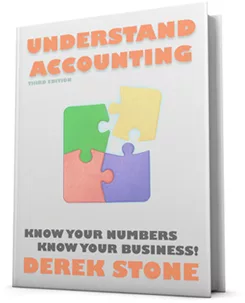Description
Here are some extracts from the book:
‘ Never ask of money spent
where the spender thinks it went.
Nobody was ever meant
to remember, or invent,
what he did with every cent.’
Robert Frost
It seems that this distinguished American poet, was a more than a little out of touch with the world of business; his attitude was likely to result in the sentiments summed up by Richard Armour in this poem:
That money talks,
I’ll not deny.
I heard it once –
It said – ‘Goodbye’.
Not a result that businesses want! They need complete records of ‘What they did with every cent’ in order to be in control and to comply with legal requirements, including those set by the tax authorities who would otherwise be likely to query their figures; again a situation in which no business wants to find itself.
Andrew asks for help with developing his business plan
“Look, Richard, I know we haven’t talked about financial things before, but something has come up and, all of a sudden, I need to put a business plan together. Do you think we could break that unwritten rule and talk about it?”
Naturally, I agreed to help in any way that I could…….. Looking over his shoulder, I could see his car in the car park. It was a real ‘I don’t care what state it’s in, provided it can get me from A to B’ job, if ever there was one.
“Are you planning to get another car?” I asked him.
Andrew saw where I was looking and grinned. “Given the state of this one, I reckon I need to, and Joe has offered to sell me his, which is just a year old, for the extremely reasonable sum, I think, of £18,000, and to introduce me to his contract clients as well.”
“Well, that’s an excellent start, Andrew. What else can you tell me about your plans?”
“Joe has a parking space on the concourse outside our local railway station…… Joe told me that I should achieve revenues of about £60,000 in the first year…… As I will be driving back to base between fares, this will mean that I will be driving about 48,000 miles in all. He gave me lots of other information too.”………I was impressed.
“OK, so that will get your new car on the road, but have you estimated its running costs, maintenance and so on?”
In chapter Two: The Transaction Spreadsheet
Andrew continues to build up a Pacioli spreadsheet in excel as he enters his budget figures. When it is completed he extracts his financial statements from it and sees how they tell him different stories about his business. Then he prepares five year plans and analyses them using ratios. Finally, now that he understands how the financial system works, we go back to meet Pacioli in 1494 and learn how the debit credit system came about.
Understand Accounting
So, if you want to be able to prepare business plans, and understand your bank manager – or your accountant – when they use financial language, then this eBook (or print on demand book) is for you.
When you have read it, visit this website and tackle the case studies, which are based on a variety of businesses, to increase your proficiency at building models and on becoming a financial detective

Reviews
There are no reviews yet.